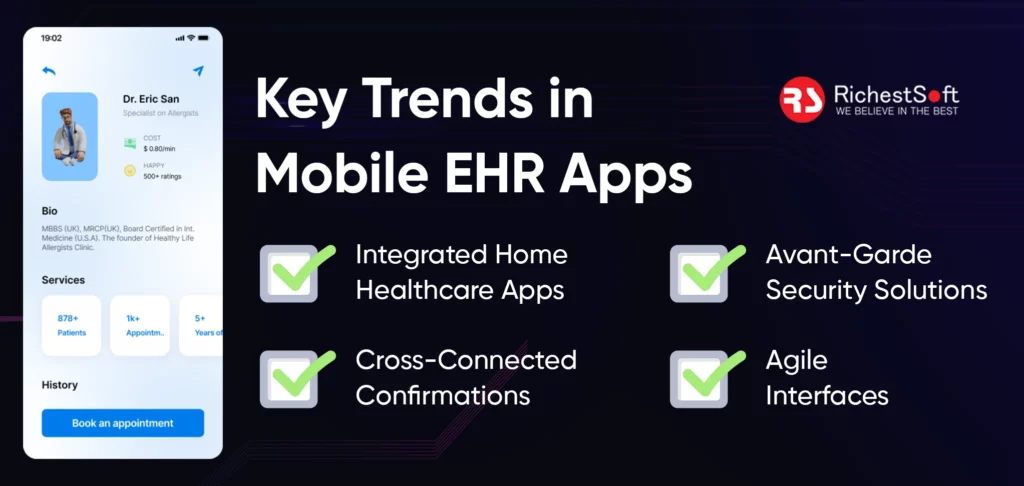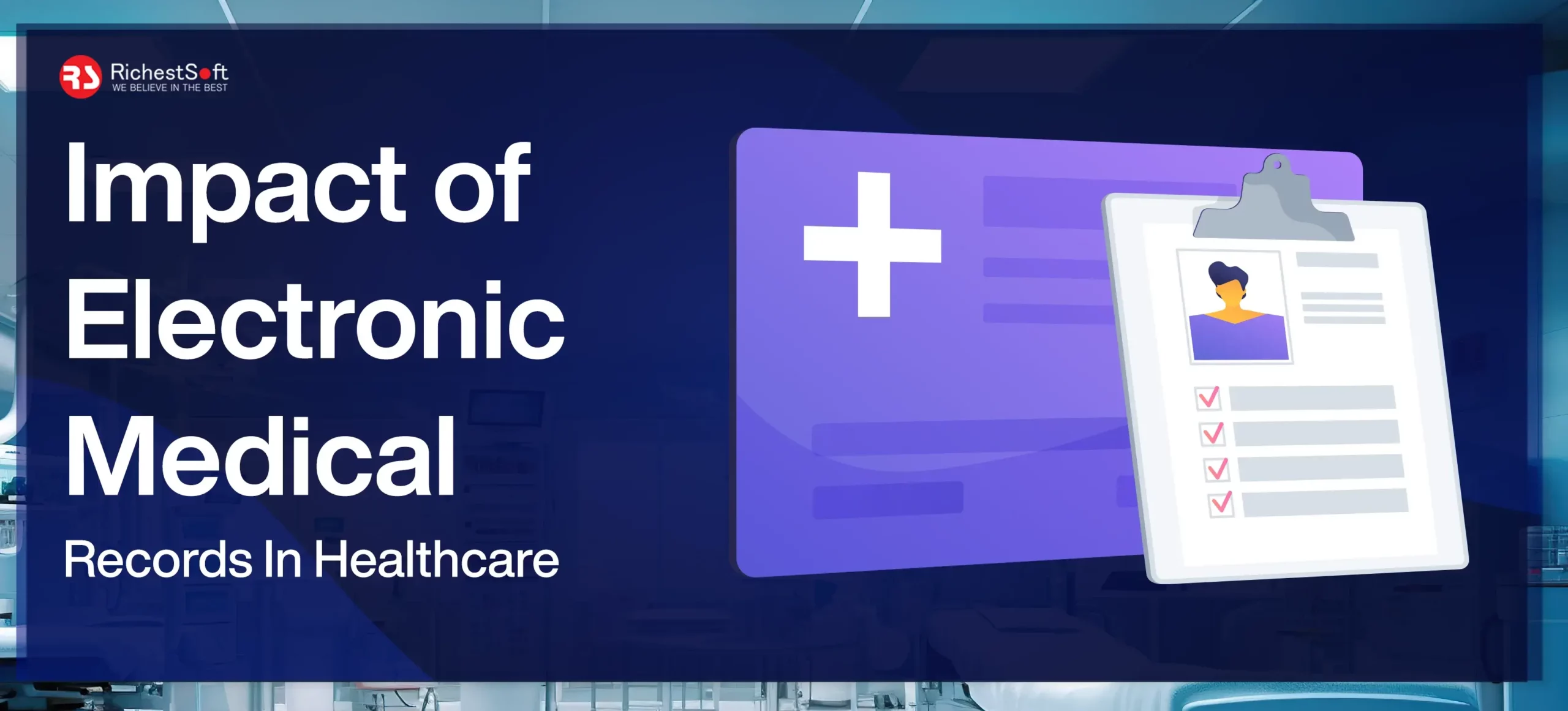October 16, 2024
The healthcare industry is an always-evolving industry that needs to be advanced with the changing era. The earlier the industry adapts the innovative technologies the more it stands out in the era.
However, EMR is an ideal example of how healthcare is shifting towards the innovative side. EMR systems have come a long way in today’s healthcare industry.
This electronically stored collection of patient-related information prioritizes better patient care and information availability.
No wonder it has eliminated the chaos with paper-based during a patient reference. Although the use of EMR software systems is increasing among medical specialists and healthcare organizations.
According to the reports of the CDC, the nation’s leading science-based, data-driven, service organization, more than 88% of office-based physicians are using an EMR system in the USA to experience the positive impact of electronic medical records in healthcare.
However, if you are looking to develop an EMR system you have come across the right platform. Below we have shared a detailed guide on the impact of electronic medical records in healthcare and we will also discuss where are electronic medical records stored. Let’s dive into the details.

What is Electronic Health Records?
Before starting with anything, have an overall understanding of electronic healthcare records.
We will define it as a digital vision of a patient’s EMR is the systemized collection of a patient’s healthcare information stored in a digital format. For example, a healthcare expert who used to check the patient’s reports on a paper sheet now spends their overall time clicking and typing on a laptop or a computer screen.
This works as a permanent fixture that includes the overall medical details of the patient for a long time unless it is not deleted.
This is what an electronic health record is! But labeling Electronic Health Records (EHRs) just as digitized variants of age-old paper medical records is a misjudgment of their potential. These EHRs are not just the aggregators of medical history, treatments, diagnoses, immunizations, radiology imagery, allergies, or lab results.
Instead, EHRs provide a more sustainable platform for a patient’s health records, designed for active, ongoing use. Such software provides seamless care and support that paper records can’t match.
EHRs are real-time, patient-centric databases that enable refined clinical administrative workflows and establish a more systemized, efficient healthcare system.
But when did electronic health records become mandatory? Let’s find the answer to this below!
Where Are Electronic Medical Records Stored
If you are confused about where to store the electronic medical records, then just chill! Whether a hospital or anything you can store the medical records digitally.
EHRs are digital records of a patient’s medical history. Using an EHR system has many benefits, including providing a bigger picture of the patient’s overall health, rather than just a snapshot of clinical data.
EHRs typically include medical history, treatment plans, diagnoses, lab results, and more. The information includes protected health information (PHI) and personally identifiable information (PII).
Healthcare businesses can see a great impact of electronic health records by changing the physical health charts to EHRs with medical records scanning.
Scanning creates a patient health digital file that can be edited, shared, and stored digitally. Most medical files can be scanned with format formats including x-ray images, EKGs, patient forms, and lab results.
After scanning, you can include patient charts with an EHR system. An EHR system helps healthcare providers manage patient’s health records, track retention periods, and protect privacy while in storage.
When Did Electronic Health Records Become Mandatory?
Well, talking about it being mandatory let us tell you that in 1991, the recommendation of the Institute of Medicine stated that each physician should use electronic health records by 2000 to prove patient care with more accuracy and security.
However, electronic health records were first used in Mayo Clinic in 1996 in Rochester, Minnesota. They were the first healthcare providers who EHR1 and moved away from the huge smoothness of healthcare organizations. In the 1960s, EMR and EHR software were only used by the government in partnership with health organizations, due to being highly expensive.
In fact, in the 1970’s it was used only in the big hospitals for billing, scheduling, and keeping the data of the patients secure.
As the substitute of “problem-oriented” medical records, healthcare professionals started storing data about a patient’s history. When properly included, EHR provides healthcare professionals with a more effective means of communication means among members of healthcare teams.
In fact, since the EHR & EMR software became more affordable and available in the 1980s, they were developed with fields that could be filled in with clinical information and stored as an electronic health record.
Why Electronic Medical Records Are Important?

So, if you are concerned with the query “why electronic medical records are important” then let us tell you that EHRs simplify access to patients’ health data and aim to have a more active role in their care. Its boundaries are beyond just doing this. Do you want to know how?
Here is the importance of using EMR or EHR:
🗹 Enhanced Accessibility
EMR facilitates instant and easy access to patient records. However, if you are concerned with the query, “What are some of the benefits of electronic health records for patients” then this is one of the benefits that showcases the essentiality of the EHR in providing a seamless and secure patient information transfer between providers and the expedites patient care processes.
🗹 Cost-effective Storage
The switch to EMR or EHR minimizes expensive off-site storage, specifically essential for practices with extensive and essential medical records. It is a financially savvy move that makes record keeping straightforward and enables it to streamline within the medical practice.
🗹 Patient Convenience
Electronic medical records enable the digital dissemination of forms and vital information, making it easier for individuals to get a medical certificate online quickly and efficiently. This is a great benefit for people who are always worried about this question, “What are some of the benefits of electronic health records for patients”. This methodology saves the patients and healthcare providers precious time and enhances their overall experience.
Impact Of Electronic Health Records On Patients And Healthcare Providers
So, electronic medical records in the healthcare industry are far better than the traditional paper-based system.
It makes a significant shift in healthcare data management by providing benefits to healthcare professionals and patients. What to know about the benefits?
Keep reading!
What Are Some Of The Benefits Of Electronic Health Records For Patients:
- Less errors compared to paper records
- Exchange of Instant and accurate information
- Enhanced treatment and diagnosis
- Patients can access their records at any time
- Keep track of medical history
For Hospitals and Healthcare Service Providers:
- Lowers operational costs
- Security and privacy of patient health information
- Enables outreach to help multiple healthcare professionals to access patient information digitally with patient approval.
- Ensures transparent interactions among hospital staff including medical and administrative staff
- Can be scalable anytime when required.
4 Key Trends in Mobile EHR Apps

When it comes to EMR systems in healthcare, innovation is always evolving. With technology advancements, we can experience the enhancement in the impact of electronic health records with effective app development for healthcare.
Here are the 4 key trends healthcare professionals can include in the EHR/ EMR mobile app development to get the positive impact of electronic health records:
1) Integrated Home Healthcare Apps
EHR healthcare apps providing home healthcare solutions interoperability are expected to be the next iconic thing. Healthcare businesses can get an EMR system developed in healthcare that is designed to address specific requirements of healthcare providers. It can be used for correspondence, coordination, medical data analysis, or even healthcare management.
EHR integration solutions create and fulfill several requirements for patients and providers. Electronic health record apps that offer comprehensive solutions are gaining more and more traction.
2) Avant-Garde Security Solutions
Patient health data is sensitive, and even though EMRs are in digitalized form, the data requires security, it is not enough to satisfy patient concerns about revealing this vital information. This becomes even more essential to behavioral health care.
Not every time, but even with the short percentage of EHR technology platforms comes the risk of data breaches and information leakage. This results in making patients consciously skeptical about uploading their information on electronic patient record systems.
Electronic data exchange can also be powered with agile authentication strategies, smart contract development service, etc for safe electronic medical records. Electronic patient record systems security is more prone to remain at the top of cloud-based EHR software.
Although, EHR and healthcare software have experienced great benefits from blockchain app development as part of Distributed Ledger Technology (DLT). Blockchain works by creating cryptocurrency wallet algorithms for cloud-based electronic medical records.
3) Cross-Connected Confirmations
With the rise in social media and the unchecked misinformation and lies trolling, reality-checking via cross-connected confirmations is the need of the hour. Healthcare misinformation could cause serious concerns among patients and sometimes even providers.
Healthcare professionals can include cloud computing in healthcare to develop cross-connections to respond to facts from rumors. EMR mobile development will be developed to counter fakes from quality goods. The main goal of this trend is to enhance the impact of electronic health records. Mobile EMR solutions can make use of healthcare analytics and AI integration services to achieve such confirmations successfully.
4) Agile Interfaces
EHR software development for mobile EHR applications is all about using advanced interfaces. While maintaining natural communication patterns and user-friendly appeal, touchless interfaces are the future of EHR solutions and EMR software development.
Healthcare informatics can be advanced to provide voice-driven interfaces in EHR software. With the high demand and the popularity of voice-driven partners like Siri and Alexa, it is only a matter of time before this trend is established across EHR software development.
Although touchless user interfaces have a significant movement in wearable devices of healthcare EMR systems.
Cost To Develop An EMR Solution For Healthcare
Well, successfully understand the impact of electronic medical records in healthcare it’s time to understand the cost to develop EMR or EHR software!
The cost to develop an EMR or the EHR solution comes within the range of $20,000 – $300,000.
However, this is just an estimate the whole cost is influenced by several factors including, the complexity of the app, the compliance, app development team expertise, features integrated, technologies integrated, geolocation, and so on.
And let us tell you having a detailed understanding of Healthcare App Development Cost is essential.
Get a Secure EMR Solution With The RichestSoft
So, if you want to stand out in the hospitality industry, choosing RichestSoft will be an iconic opportunity for your business needs. We develop a powerful EMR solution that has numerous benefits for EHR systems with a huge technological impact on EHR.
Also, we specialize in Integrating Artificial Intelligence (AI) and Machine Learning (ML) to boost EHRs’ capabilities, equipping them with predictive analytics to support healthcare professionals in making informed, proactive decisions about patient care.
We have high proficiency in healthcare IT consulting and web development.
For healthcare departments looking to launch home health care software with top-notch home health EMR systems, and EHR solutions, RichestSoft is the best solution for them. So, don’t struggle just contact us!
Conclusion
Overall, technologies like EMR are holding the new standards for healthcare providers. And no wonder it is quite helpful in offering better patient care with the positive impact of electronic health records.
We hope our guide has successfully helped you to solve your queries about your concerns like, “When did electronic health records become mandatory, why electronic medical records are important, where are electronic medical records stored”
The demand can be fulfilled by a reliable healthcare app development company like RichestSoft that can build scalable EMR solutions. We have 15+ years of experience in developing the right EHR software that meets the specific needs of healthcare providers.
We build an EMR system with tailored functionality while meeting regulatory compliance and industry standards.

 +1 315 210 4488
+1 315 210 4488 +91 99888 06489
+91 99888 06489






